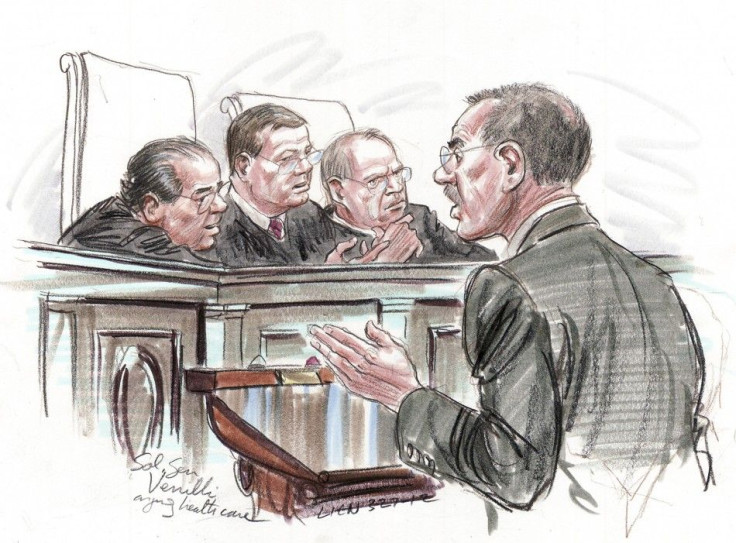Health Care 'Severabilty': Where The Supreme Court Justices Stand

The early session on the final day of Supreme Court arguments over the fate of President Barack Obama's health care overhaul centered on how much of the law would have to be tossed if the part requiring Americans to buy medical insurance is deemed unconstitutional.
The debate over severability had an added significance since questions from the court's conservative justices Tuesday indicated a majority might strike down the law's individual mandate.
Paul Clement, the lawyer representing the 26 states challenging the law, argued Wednesday that if the insurance mandate is found to violate the Constitution, the remainder of the law should be thrown out as well. Congress, explained Clement, wouldn't have adopted other major changes to the U.S. health care system without that key component.
4 Justices Say Congress Should Determine How Much Of Law Is Mandate-Dependent
In Wednesday morning's session, most of the justices appeared skeptical of Clement's argument, according to the Supreme Court's official blog, although the court's conservatives -- including possible swing vote Justice Anthony Kennedy -- leaned toward invalidating the entire law. The four liberal justices, in frequent, pointed comments, said the court should leave it to Congress to determine how much of the law is actually dependent on the mandate.
Still, a common reaction across the bench was that the justices themselves didn't want the tedious task of going through the entire 2,700 pages of the law to decide which provisions should be upheld and which should be stricken, saying that task should fall to Congress. But they couldn't agree on the scope of that task.
The court was presented three main options: void the entire law along with the mandate (as the plaintiffs argued); strike down only two, albeit significant, provisions tied to the mandate; and throw out nothing but the individual mandate (as a lawyer picked by the justices argued).
Chief Justice John Roberts, another possible swing vote, pressed lawyers on both sides. He pointed out that many parts of the law are linked directly to the individual mandate and that most were needed to get the full legislation through Congress in 2010.
Scalia: If Mandate Is Gone, So Is The Statute
Comments from Justice Antonin Scalia, one of the court's conservative stars, may have captured the essence of the debate. After initially saying it just couldn't be right for the law's many mandate-connected provisions to be struck down with the requirement itself, Scalia later posited that because the mandate is the core of the legislation, its abolition would mean the entire law had to go.
My approach would be to say that if you take the heart out of this statute, the statute's gone, Scalia said.
Deputy Solicitor General Edwin Kneedler, representing the Obama administration on Wednesday, argued that only two provisions should be struck down if the mandate were found to be unconstitutional. However, those parts -- one bars insurers from refusing coverage due to a person's existing medical condition, the other prevents overcharging based on a patient's age or health -- are widely popular among the American public.
A liberal justice, Sonia Sotomayor, said the court would be overreaching if it presumed that Congress would have passed the law's myriad unrelated provisions only if it had been certain that the insurance-purchase requirement would remain intact.
Sotomayor, an Obama nominee, suggested that members of Congress, directly elected by voters, should ultimately make the final decision, not the court.
Justice Ruth Bader Ginsburg, another of the court's liberals, argued that allowing Congress to handle the matter, assuming the mandate is struck down, is the more conservative option.
It's a choice between a wrecking operation ... or a salvage job, Ginsburg said.
That sentiment was echoed by Justice Elena Kagan, also nominated by Obama, who in defending elements of the law that aren't related to the mandate asked, Is half a loaf better than no loaf?
However, Kennedy and conservative Justice Samuel Alito said the real act of judicial activism would be imposing a risk on insurance companies that wasn't intended when Congress passed the law. Because the mandate would bring healthy people into the insurance market, it would offset the cost of requiring insurers to cover everyone.
An outside lawyer, H. Barton Farr III, was hired to argue that the mandate could be severed without affecting the law's remaining provisions. He said that while the law without the mandate would be less desirable, the task of addressing that issue should fall to Congress.
However, both Kennedy and Scalia contemplated whether Congress -- notoriously known for its partisan gridlock in recent years -- would be able to tackle the issue. Kennedy asked whether expecting lawmakers to address the issue was a reference to the real Congress or the hypothetical Congress.
--
© Copyright IBTimes 2025. All rights reserved.




















